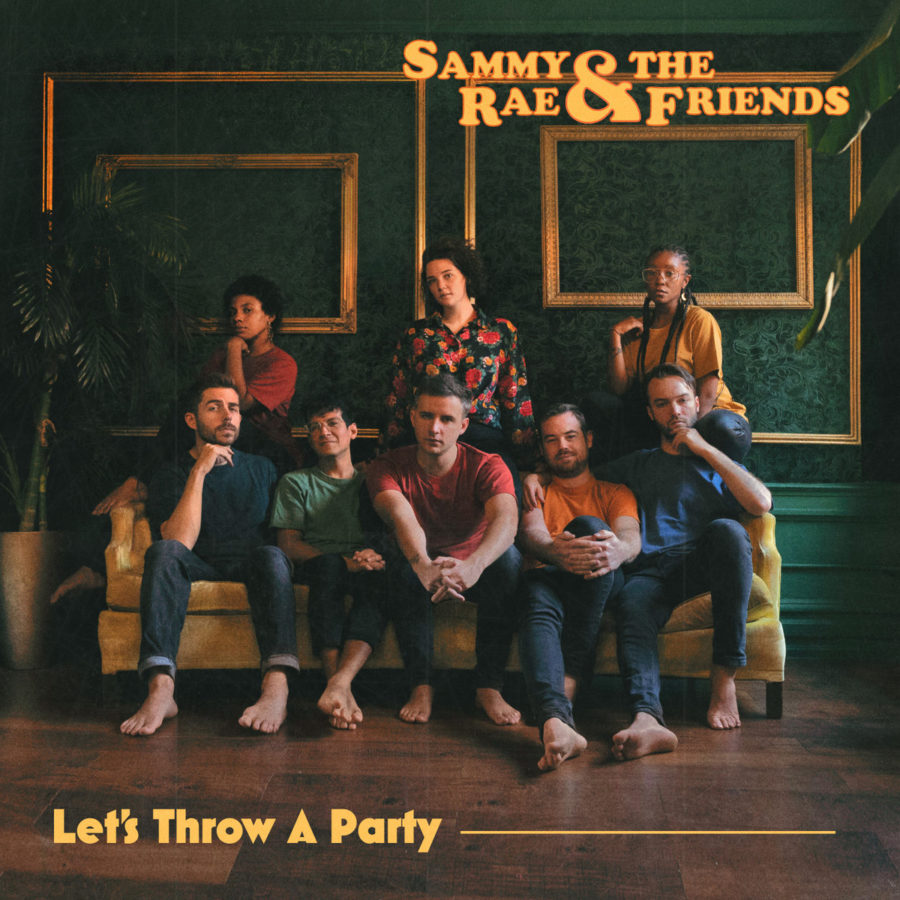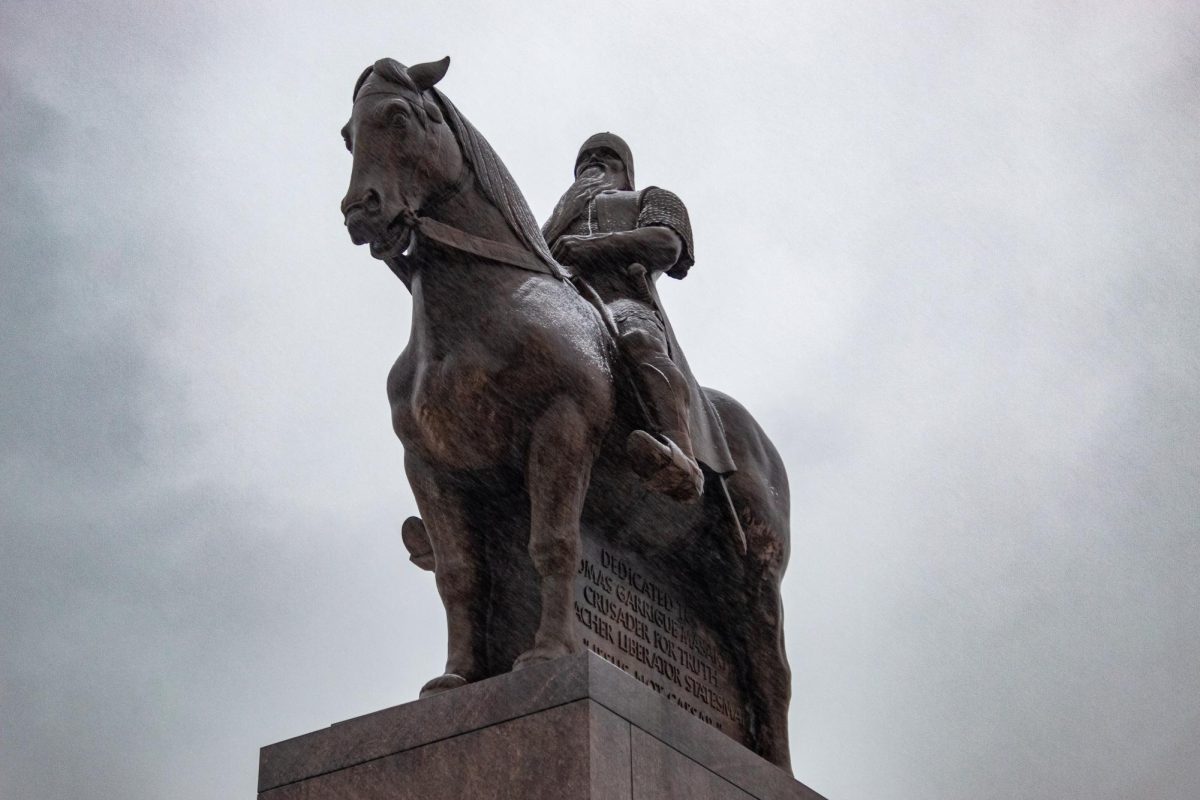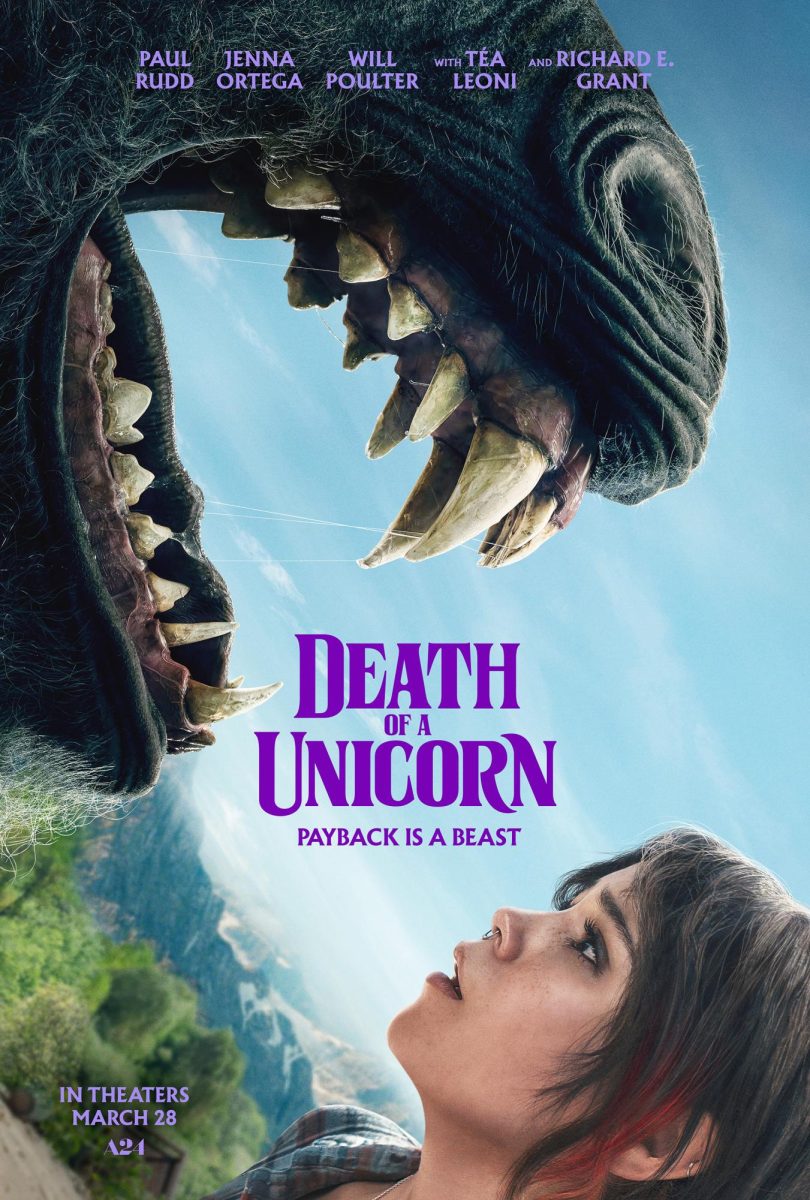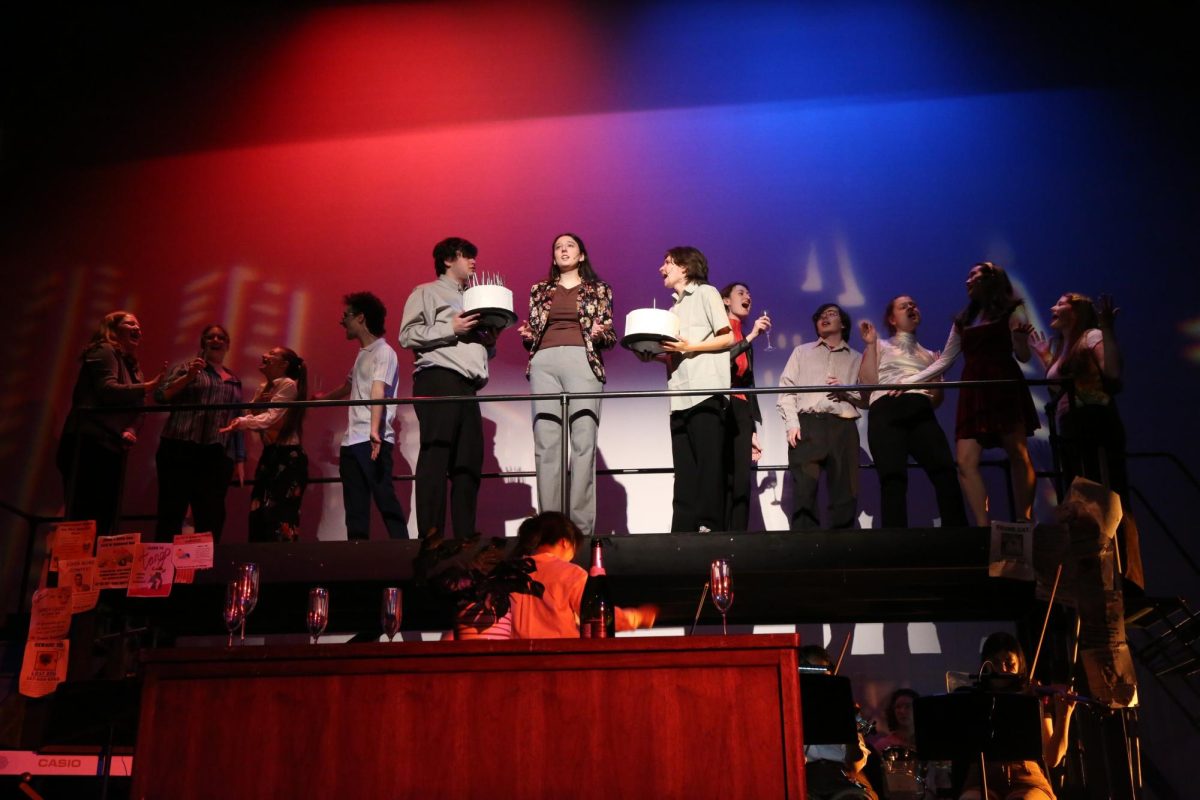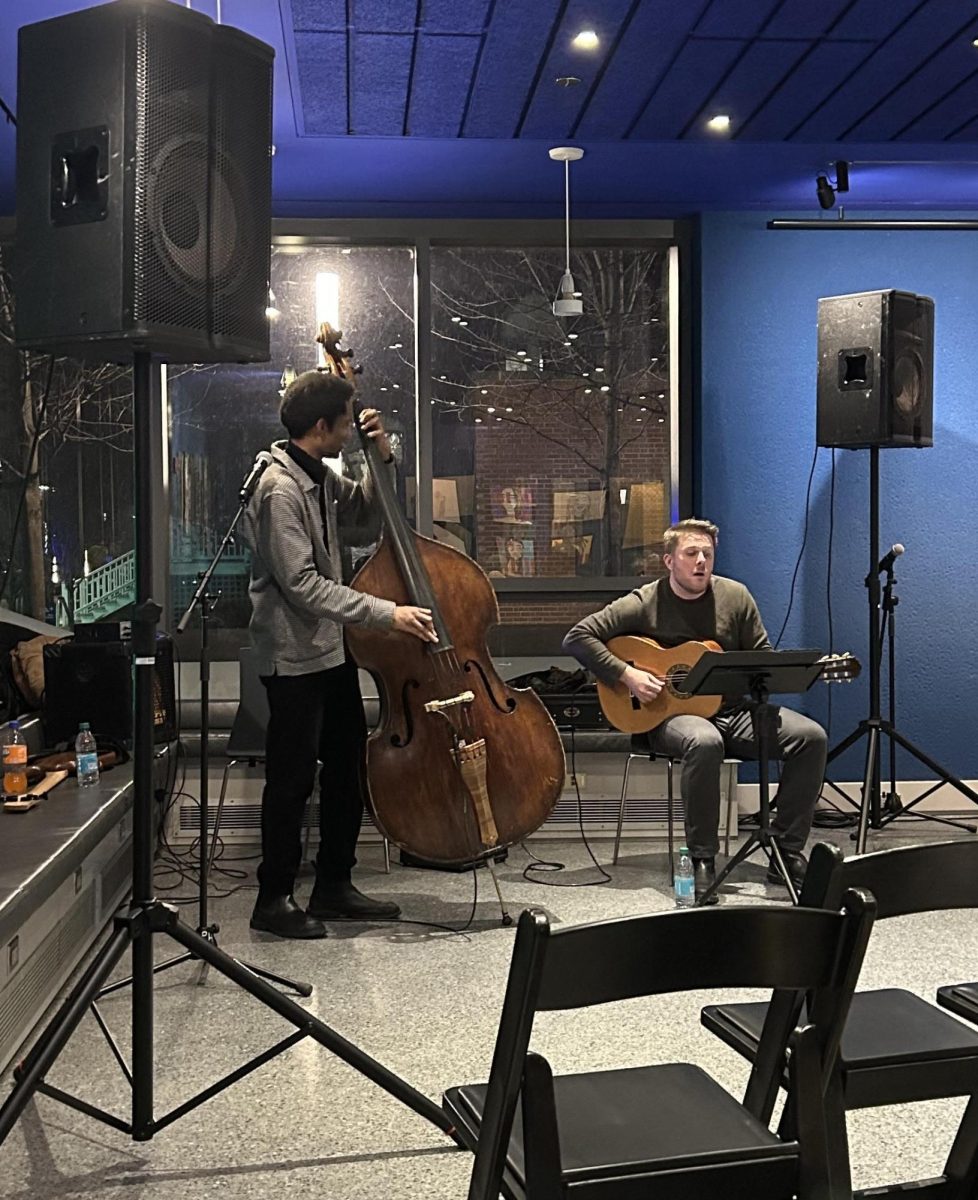I’ve been listening to Sammy Rae and the Friends for over a year now, and very few things give me a surge of serotonin quite like the opening notes of a song like “Let’s Throw a Party” or “Creo Lo Sientes.” A burgeoning group who might be best described as a big band throwing a dance party, Sammy Rae and the Friends are wonderful.
I was lucky enough to sit down with Rae to discuss queerness, her lyrics, and her life’s ambition to become the next Mr. Rogers.
Evan Williams: I started listening to your music about a year ago, but I got really into it this past winter, and it felt like this really warm and cozy and happy bubble to live inside during the misery of a Chicago winter, and so I’m curious how joy plays into your work and your daily life.
Sammy Rae: Sure. Well, first of all, thank you, that’s so kind, what a beautiful thing you just said. I’ve never really thought about that before: How does joy play into my work and what we do? It’s really the motivating factor behind everything. As artists, we all make different sorts of music—whatever works best for us—and I have a fine enough time holding and unpackaging and processing my sadness. The things I want to commemorate with songs are joy and self-expression and that sort of thing, and that’s what I want to give our audience. I hope we’re giving them a realistic interpretation of how I move through the world and how other people move through the world, but what I appreciate about our project is that a lot of our output is tunes about joy where we’re very much in a child-like mindset. We’re big on play, you know, so we’re very physical when we’re on stage, we’re very physical as people, we’re very big, imaginative thinkers. I would like to say that most of us try to live kind of simply and focus on the big stuff, so the product of that is tunes that are infused with joy and music that I hope reaches as many people as possible. I do think about trying to work against the average listener—we do have a demographic, it’s predominantly young, queer college folks—but my hope is that their parents can really enjoy the show and if they have kids, the kids can come and really enjoy the show, so I think when it comes to trying to make things accessible to as many people as possible we have to focus on the big stuff, and the big stuff we want to focus on is joy, you know?
EW: Speaking as a young queer college student who is also a fan, I want to know how are you thinking about queerness in your music and how the big band vibe ties into ideas of “chosen family”?
SR: Right, well you just said it, “chosen family” is a cornerstone of the queer experience. My thinking is that to be queer is to be unlimited. That’s always the way I’ve thought about it, it’s to never have to be or, you can be and and and and and and and, which is so exciting. I want to make sure that I am making art that serves the people who are consuming it. We’ve had so much time touring now to get to know the people listening to the music, and because we are this chosen family of folks and a number of us are queer, I think we’ve attracted in the music we make, the stories we tell, we’ve attracted those people as well, which is a thrill. And the more we get to know them, the more I want to make music that serves them because I love them and quite literally want to be friends with everybody. We [as a band] have this really unique thing—and I think I speak for all of us—where we look out in the audience and at everybody in the first couple rows and we can just pick up their vibe right away. It’s like, “You’re cool, I want to be here, I want to be with you, I want to be friends with you.” We’re also constantly told by venue workers that everyone is carrying each other’s drinks and they’re so thoughtful, that everybody tips really well, so we’re very proud of the sort of community that we’re surrounded by and the kind of community that we attract, and I want to continue to make music that serves them. We’re so grateful and we want to continuously express our gratitude for them coming out and supporting us so we can live this magical dream and do the thing that we love with our chosen family, and I want to say thank you for that. So, it’s this beautiful cyclical thing where I’m continuing to make music that serves that community which happens to be queer, and it inspires [us to do] what we want to keep doing. I want to make things that they like, but they’re so much like me that that’s easy. But yeah, in trying to be accessible to everybody I’m not trying to generate an exclusively queer environment. I think that’s a struggle with a lot of queer folks—speaking with the queer folks I know—the struggle is “I want to not just be othered, I want to just be, just be part of something.” So, my hope is we can create a space where [these folks] feel safe to do that and also safe around other people who are on the same vibe and want to come to the show.
EW: How has touring been?
SR: It’s crazy. Me and the band, we keep finding each other and being like [mock grumpy voice], People keep asking me “How’s touring?” and I don’t know what to say, because it’s, like, what aspect? Traveling? That’s a lot. It’s a lot to process but we’re getting the hang of it. Audience encounters. Crowds are getting bigger. That’s also a lot to process but we’re handling it. Interpersonal relationships like band and morale. That’s a lot and we’re all processing it. Touring is a lot. It’s great, it’s beautiful. But especially after the three weeks of this West Coast run we just came off of, it’s really starting to sit on us that this is a lifestyle and it doesn’t necessarily end. We’re gonna do this month and then we’re gonna have a month off and then we’re gonna jump into the festival touring for the summer, so it has been a few months of really processing that all of us are really making a lifestyle change. We’re very grateful and very lucky to be doing it, especially in light of current circumstances, and it’s great. We’re all in this weird blooming phase as both a group and individuals and it’s nice, it’s nice to be a part of. We feel up for the challenge and we’re learning about what we need to do as a group, as individuals physically, mentally, emotionally, to put on the best shows we can every night no matter what city we’re in.
EW: Logistical question for a band of your size: How are you moving around?
SR: So up to this point we’ve been in a sprinter van which sits 12 people and you can kind of stand up in it, it’s got this huge cargo hold in the back so that’s where most of the gear’s been living, but this leg of the “Follow Me Like the Moon Tour” which we depart for in like six days, that’ll be our first tour on a tour bus, so we’re very excited. We’ll all be sleeping on the bus, all the gear will be attached to a trailer in the back, and that makes a lot of things much easier. It’s easier being able to tour for such an extended period of time—it’s four months out, ya know, it’s not a fiver and then we come home, which is what we were really used to before this year. It’s great because we have a couple more days off than usual in between each show, but it’ll be four weeks, we’ll be in the bus, and it’ll be a sleepover every night and we’ll see what happens—we don’t know what to expect.
EW: I want to talk about lyrics. I love your lyrics; I think they’re amazing. I was checking out your website and I noticed that there’s a whole section devoted to what’s called “Read,” and I love that because all the lyrics are just right there, and you can read them as little poems or stories or however you want to conceive of them, and I don’t think I’ve ever seen a band do that.
SR: Wow, thank you for that. Yeah, there’s a lot of words in all the songs and they move really quick, and I don’t want you to miss anything, so if you want to check it out, it’s online.
EW: They do seem very narrative—how do you think about narrative and soundplay and all that good stuff?
SR: You know…when I was young, I realized this craft of songwriting—like lyrics and music together—that’s song, and you can kind of tell a story in metaphors and secret code that might mean one thing to you and one thing to the audience, that’s fascinated me since I was young. A lot of people who fascinated me early on were Bruce Springsteen, Paul Simon, Elton John, Bob Dylan, and what’s interesting about their music is that they’re so hyper-detailed, they’re so narrative, they insert you into what they’re trying to paint for you, the story they’re trying to tell. But, they very consciously leave enough room, enough vagueness, that the audience can insert themselves into the thing. You listen to a Bruce Springsteen song and the first verse is, you know, “I saw her standing here in this part of the room, she was wearing this, this was this, the weather was this, the weather was that,” so you’re really there listening to the story, you’re very invested, but he gives you enough space to insert your own perspective into it. I’ve always thought that to be a good songwriter is to find that balance. It means so much to me that I’m really getting my point across, but I’m leaving enough room for you, because once the song leaves me it’s not about me, right?
We have this song, “The Box,” which I was writing as a very clinical observation of the gender binary, I guess—What is gender? What’s going on?—and it’s also a bit of a love song. I wrote that song with that in mind and the way that it has been perceived in so many different ways by so many different people. That’s the tune where I think whatever that magic line is where I’m getting my point across and you get it but it’s also your point, I think we nailed it in that song, so I’m proud of it for that.
EW: What are you listening to or reading or watching right now that you just can’t get enough of?
SR: This is the year of Paul McCartney for me. I’m really deep into Wings, the project that came after the Beatles…really deep into that. The Paul McCartney records and the elements of those songs that make them so uniquely Wings records is huge, big orchestration, lots of different things going, lots of games. The song “Let’s Throw a Party” was very much influenced by that listening because it’s almost like four songs that are stuck in one song that make no sense together but somehow, they do. It’s more of an epic than a song. So, I’ve been listening to a lot of that and a lot of music similar to that recently, trying to think about how to take arrangements to a bigger place.
EW: There’s a lot of heavily layered sound and so many different things going on in a lot of your songs, especially ones like “Creo Lo Sientes.” You said earlier that things are simple—how do those two things fit together for you?
SR: Whatever we feel is drowned in all this hand percussion and toy instrument stuff, it’s a cornerstone of that whole arrangement [“Creo Lo Sientes”]: There’s a million different things going on but when you boil it down it just makes the groove. For this one the groove happened to be that instead of using CBASS on the drum kit where he’s got two toms, a snare, all these cymbals, the crash, the kick, it was like: Here you’ve got a wood block, here you have a conga, you have two bongos, you’ve got this triangle, you have these things. There’s a lot of different arrangement things going on in there so that the sound is huge, but what we’re saying is that it (the sound) is whatever you feel, it’s whatever you want, and that’s really all that there is.… It’s whatever you feel.… In the effort to keep it simple, the subject matter is very simple.
EW: I came across an interview where you said ultimately you wanted to get into children’s music. Is that still something you think about doing, even now?
SR: Yes! I met a couple of the band members in the kids’ music scene—this always comes up in interviews, people are like, “What is your thing with kids’ music?”—I met a couple people in the kids’ music scene, I met C-BASS and kind of Will [Leet] in this network of musicians in New York that play birthday parties and kids’ classes and they’re all like super killing because they wake up every day, and they play their instrument all day for kids in this really low-stakes environment, and all of them are so nice! My first real creative odd job was essentially being a music teacher for kids, and when I stopped waiting tables and nannying and all that I started making kids’ music. Some of my production experience comes from when I was working with a kids’ music production house for a while and I was in-studio and I was conducting the kids and helping with engineering those sessions, so it’s a big part of where I come from creatively.
Again, to the themes of joy and the child mind and play. I’m really fascinated by the perpetual child archetype—Mr. Rogers and Pee-wee Herman and Raffey, if you know Raffey, SpongeBob SquarePants—I’m really into this perpetual child, always in tap with that mindset there—especially like Mr. Rogers—and it’s always been a bar to me: Let’s make all this music as accessible as possible. If a kid could understand it, then anybody could understand it, so if I’m talking way too much about this thing or the words are too complicated, I scale it back. So, I’m always thinking about kids and making music, and I have this dream for the second half of my career… I want to be, like, an iconic kids’ show host, I want to be Mr. Rogers very badly. I don’t think I can actually get into that until I’m a mom myself, or a parent, it’s definitely a later in life thing, but I have such a history with kids’ music. I’m so fascinated by pedagogy and the way that kids perceive music and perceive art and I think that they are chronically underestimated.
I would call “Saw It Coming” a kids’ song. In that song I very distinctly wrote with the intention of it being accessible to kids, you know—“what you did was not good, what you did was good, and careful because you never saw it coming, good stuff or the bad stuff”—I intentionally followed that line of thinking and there’s no reason “Saw It Coming” is not the theme song of my kids’ show. I have this dream of a future show, where we’re making really killing music that doesn’t underestimate kids, for kids.
EW: Is there anything that you have right now in your personal life, your artistic life, that you really, really hope your future self hangs on to?
SR: Damn. It’s an interesting question. This thing didn’t really show up until a couple of years ago in my life, this line of thinking that’s like, “I can get through this, I promise,” from totally unrelated stuff like, “Oh my god I’m so tired and I don’t know if I can get through this show,” or, “I have five shows left on this run I don’t know if I can do it”—but then I would do it and then I would remember that I could do it. Or, “I don’t want to go to the doctor’s office, it stresses me out,” and then I would be at the doctor’s office all stressed and I would go, “Oh but remember when you didn’t think you could pull off those five days of tour and then you did? If you could do that, you can pull this off.” So this line of thinking has only showed up maybe in the last two years of my life where I’m just really, actually, truly, honestly, authentically not doubting myself, and believing that I will find a way to turn it out when it needs to be turned out, and I’m really enjoying being in that place of really, really, truly, honestly trusting and believing in myself. I hope that I stay there for a long time. It took me long enough to get here.
EW: Cheers to that.



